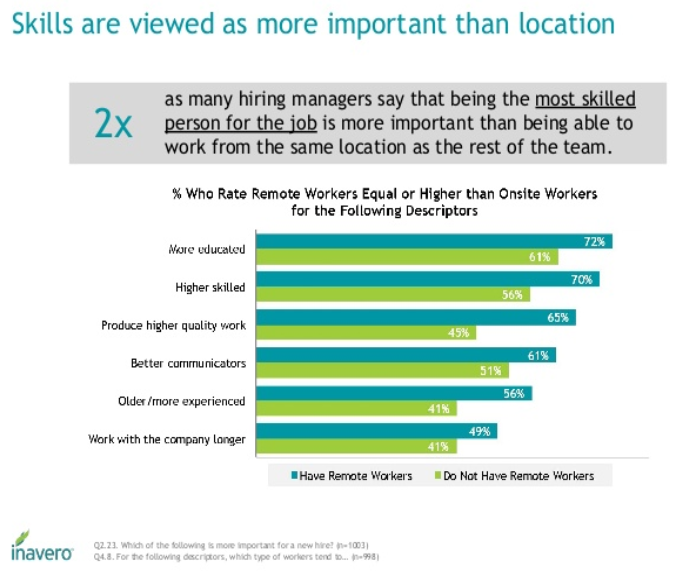A study that surveyed 1,005 hiring decision makers commissioned by Upwork sheds some interesting insights on the attitudes around remote workers and the challenges hiring managers are experiencing finding talent. The remote workforce is the future after all and this study offers both insight into challenges and solutions.
It was noted that talent is becoming harder and harder to find (up to three times more difficult than in past years). Meanwhile, remote work is on the rise, according to 55 percent of managers.
The overarching attitude toward offices becoming temporary anchor points is increasing, indicating that commutes are becoming less common (albeit slightly). Companies are increasingly embracing remote work, and according to 38 percent of those surveyed, it will become the predominant workforce.
A major challenge remains that company policies aren’t caught up to remote work – they are lagging behind or non-existent according to 57 percent of organizations.
Over half of all companies surveyed are using more temporary, contract, or freelance workers and the majority of hiring managers believe agile teams will become the norm in the near future.
Perhaps the juiciest tidbit, the fact that skills are viewed as more important than location suggests that at the end of the day…

If you have the skills, you can live basically anywhere. Remote and freelance work offers a variety of opportunities and means you don’t have to be synchronously local to a team to get work done. This means that you don’t need to be in a big city like New York or Los Angeles to get the big work and have access to opportunity.
Companies are struggling to find talent, and despite a lack of policy support, are opening up to remote work. Adding to this challenge is that more and more Americans are less mobile, due to concerns about cost of living (or other things in our lives), hiring managers are having a harder time finding the right talent to fill their own vacancy.
Skilled workers (those who have the abilities that are in demand and desired by their industry) have the ability to pick and choose where they want to live and it looks like now and the future, companies are coming to meet them. This is good news, and offers more and more opportunities, as well as flexibility for hiring managers.
Kam has a Master's degree in Industrial/Organizational Psychology, and is an HR professional. Obsessed with food, but writing about virtually anything, he has a passion for LGBT issues, business, technology, and cats.












































